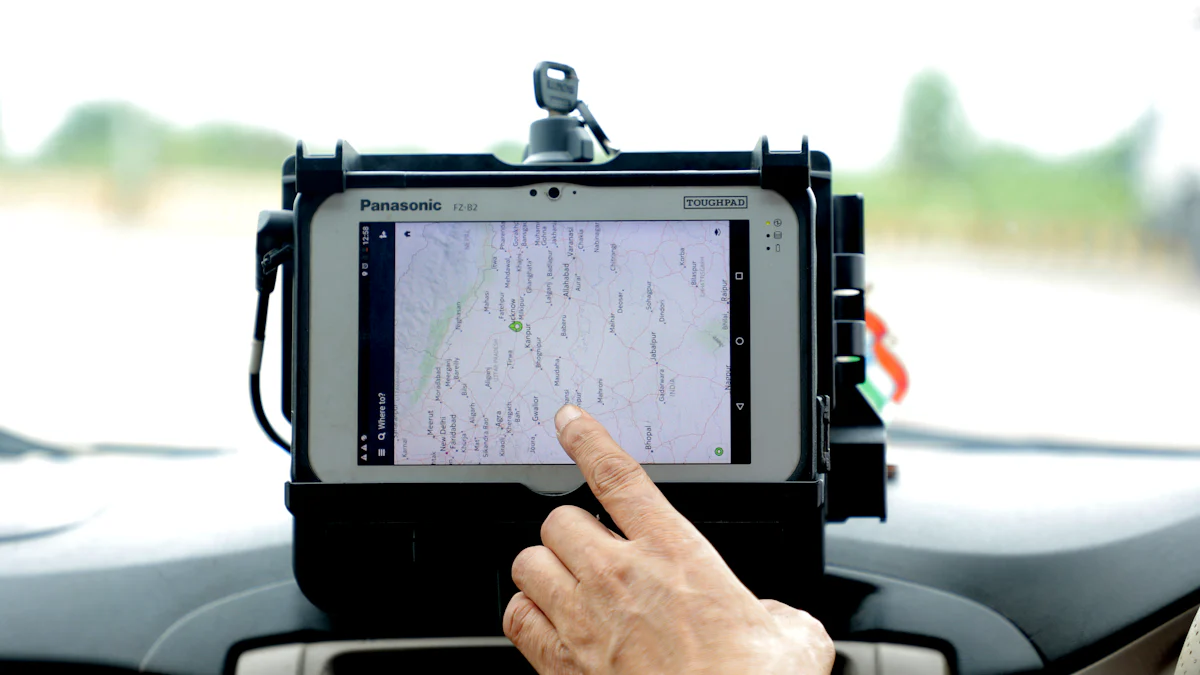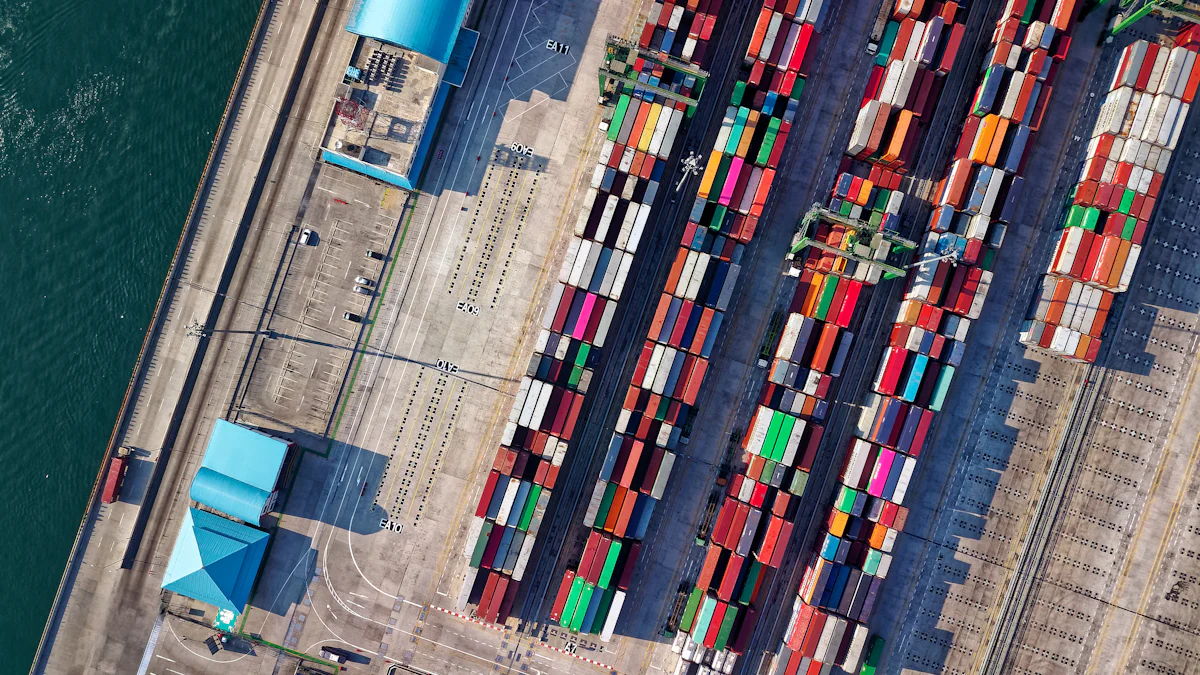Investigate how IoT technology can improve logistics operations through real-time tracking and data analytics

The Internet of Things (IoT) is transforming the logistics industry by linking devices to collect and analyze data. IoT technology enables real-time tracking, significantly boosting operational efficiency. The logistics sector is poised to benefit greatly from IoT, with its market value expected to reach $63.7 billion by 2026. Through real-time tracking and data analytics, IoT enhances supply chain visibility and supports informed decision-making. JUSDA Supply Chain Management harnesses IoT to facilitate seamless logistics operations. JUSDA's cutting-edge platforms provide real-time collaborative solutions, ensuring optimal resource utilization and accurate business decisions.
Understanding IoT Technology in Logistics
Components of IoT in Logistics
Sensors and Devices
IoT sensors play a crucial role in logistics management. These sensors gather data on shipments, vehicles, and warehouse operations. Logistics professionals use this information to optimize supply chain visibility and improve decision-making. IoT sensors track inventory levels and monitor the condition of products in transit. Sensors also optimize warehouse space. Popular IoT devices in logistics include GPS trackers, RFID tags, temperature sensors, telematics devices, environmental sensors, smart cameras, and load sensors. These devices serve specific purposes, ensuring efficient logistics operations.
Connectivity and Networks
Connectivity forms the backbone of IoT technology in logistics. Wireless devices such as RFID tags, eSIM, and GPS sensors enable logistics companies to track shipments' locations. These devices monitor container temperature, relative humidity, and other real-time conditions. Continuous cargo tracking with IoT provides accurate real-time data on cargo location and status. This connectivity ensures seamless communication between devices, enhancing operational efficiency.
Data Processing and Storage
Data processing and storage are vital components of IoT in logistics. IoT devices collect vast amounts of data from various sources. Logistics companies analyze this data to gain insights into operations. Data analytics helps identify patterns and trends, facilitating informed decision-making. Efficient data storage solutions ensure that valuable information remains accessible. This accessibility supports ongoing improvements in logistics processes.
Role of IoT in Supply Chain Management
Inventory Management
IoT technology revolutionizes inventory management. Real-time tracking and monitoring provide continuous updates on inventory levels. IoT sensors ensure accurate stock levels and alert logistics professionals when supplies run low. This capability reduces lead times and enhances supply chain efficiency. Inventory management becomes more precise and responsive with IoT integration.
Fleet Management
Fleet management benefits significantly from IoT technology. IoT devices in delivery trucks optimize routes based on real-time data. This optimization reduces fuel costs and ensures timely deliveries. Real-time tracking of shipments and trucking equipment enhances operational efficiency. Fleet managers make informed decisions using data-driven insights from IoT devices.
Warehouse Operations
Warehouse operations improve with IoT integration. IoT sensors monitor environmental conditions within warehouses. These sensors ensure that sensitive goods remain within recommended parameters. Real-time data collection and analysis enhance warehouse management. IoT technology supports efficient resource utilization and risk management in warehouse operations.
Real-Time Tracking in Logistics

Benefits of Real-Time Tracking
Enhanced Visibility
Real-time tracking technology enhances visibility in logistics. IoT devices provide accurate shipment locations and conditions. This visibility allows logistics managers to monitor operations closely. Managers can address issues proactively, ensuring smoother processes. Enhanced visibility leads to more efficient logistics management.
Improved Efficiency
Real-time tracking significantly improves efficiency in logistics operations. IoT systems optimize routes for delivery trucks. Route optimization reduces fuel costs and travel time. Efficient route planning ensures timely deliveries. Improved efficiency results in cost savings and better resource utilization.
Better Customer Service
Real-time tracking elevates customer service in logistics. Customers receive accurate estimated arrival times for shipments. Timely updates enhance customer satisfaction and trust. IoT technology enables logistics companies to offer reliable services. Better customer service strengthens client relationships and brand reputation.
Technologies Enabling Real-Time Tracking
GPS and RFID
GPS and RFID technologies play crucial roles in real-time tracking. GPS devices provide precise location data for shipments. RFID tags offer detailed information about product conditions. These technologies ensure continuous monitoring of logistics operations. GPS and RFID enhance supply chain visibility and control.
Mobile Applications
Mobile applications facilitate real-time tracking in logistics. Logistics professionals access shipment data through mobile apps. Apps provide instant updates on delivery status and conditions. Mobile technology supports efficient communication among stakeholders. Mobile applications streamline logistics processes and decision-making.
Cloud-Based Platforms
Cloud-based platforms support real-time tracking in logistics. These platforms store and process vast amounts of data. Logistics companies analyze data for insights into operations. Cloud technology enables seamless collaboration among supply chain partners. Cloud-based platforms enhance logistics efficiency and effectiveness.
Leveraging Data Analytics in Logistics

Types of Data Analytics
Descriptive Analytics
Descriptive analytics provides insights into past logistics operations. Companies use data to understand trends and patterns. This analysis helps identify areas for improvement. Descriptive analytics offers a clear picture of logistics performance. Managers make informed decisions based on historical data.
Predictive Analytics
Predictive analytics forecasts future logistics scenarios. Companies analyze data to anticipate demand fluctuations. This foresight enables better resource allocation. Predictive analytics reduces uncertainties in logistics planning. Businesses prepare for potential challenges with greater accuracy.
Prescriptive Analytics
Prescriptive analytics suggests optimal logistics actions. Data-driven recommendations enhance decision-making. Companies implement strategies to improve efficiency. Prescriptive analytics identifies the best courses of action. Logistics operations become more streamlined and effective.
Applications of Data Analytics in Logistics
Demand Forecasting
Demand forecasting predicts customer needs accurately. Companies analyze data to anticipate product demand. This insight optimizes inventory levels and reduces waste. Accurate forecasts prevent stockouts and overstock situations. Businesses maintain a balanced supply chain with demand forecasting.
Route Optimization
Route optimization enhances delivery efficiency. Companies use data to plan the best delivery routes. Optimized routes reduce fuel consumption and travel time. Efficient routing ensures timely deliveries and cost savings. Logistics operations become more sustainable with route optimization.
Risk Management
Risk management identifies potential logistics disruptions. Companies analyze data to assess risks in the supply chain. Proactive measures mitigate the impact of unforeseen events. Risk management ensures business continuity and resilience. Logistics operations remain stable and reliable with effective risk management.
Key Findings:
McKinsey Study: Companies investing in logistics analytics have seen up to a 20% increase in profits.
Infosys BPM: Big data analytics empowers logistics professionals to make accurate demand forecasts and optimize inventory levels.
LinkedIn: Data analytics offers a competitive advantage by providing actionable insights that drive efficiency, reduce costs, and enhance customer satisfaction in supply chain logistics.
JUSDA's Integration of IoT and Data Analytics
JusLink Platform Capabilities
Real-Time Collaborative Platforms
JUSDA's JusLink Smart Supply Chain platform revolutionizes logistics operations. The platform integrates IoT, cloud computing, and big data analytics. This integration enables seamless connectivity across the supply chain. Businesses experience enhanced communication and information sharing. The platform supports various industries, including electronics and automotive.
Intelligent Supply Chain Systems
The JusLink platform offers intelligent supply chain systems. These systems optimize resource allocation and production processes. JUSDA employs lean methodologies to enhance productivity. The platform provides tailored solutions for specific industry needs. Businesses benefit from cost-effective and agile supply chain management.
Case Studies and Performance
Global Presence and Network
JUSDA boasts a global network with over 155 locations. This extensive presence ensures efficient logistics solutions. The company excels in end-to-end supply chain management. JUSDA's expertise spans industrial and distribution chains. The company supports clients from component manufacturing to end-consumer delivery.
Recognition and Awards
JUSDA has received numerous accolades for its innovations. The company appears on the Chinese logistics service industry unicorn enterprise list. JUSDA also features on the Hurun Global Unicorn List. The company's commitment to excellence garners recognition worldwide. JUSDA's achievements highlight its leadership in supply chain technology.

After the update
Supply Chain Management Solution
IoT technology transforms logistics by enhancing various aspects of the supply chain. Real-time data collection from vehicles, assets, and inventory enables logistics firms to make data-driven decisions. Companies reduce costs and provide better service to customers. IoT leads to synchronized operations and streamlined management processes. The future holds potential for further advancements in IoT applications. Logistics firms will continue to benefit from improved visibility and efficiency. Adopting IoT and data analytics remains crucial for maintaining a competitive edge in the logistics industry.
See Also
Exploring the Hidden Power: AI in Logistics Revealed
Artificial Intelligence in Supply Chain: Transforming Future Logistics
Opening the Way: Tomorrow's Logistics Powered by Digital Tech
Innovative Advances in Logistics Technology: Exploring Future Paths
Transforming Logistics: How Supply Chain Innovation is Changing the Game
